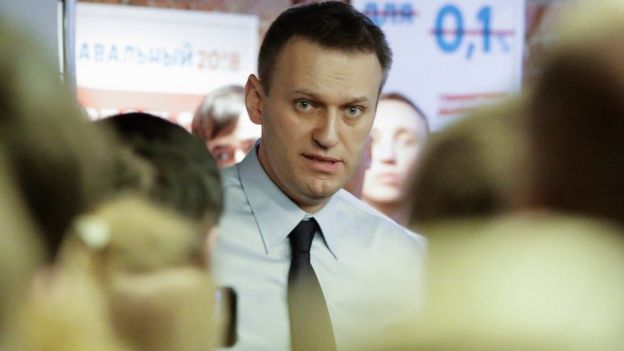
This article is more than
8 year oldIt bars him from running for president next year against Vladimir Putin.
But Mr Navalny has vowed to take part in the race regardless. He denies the charges and says he will appeal against the verdict.
His conviction came in a retrial after the European Court of Human Rights ruled the first trial to be unfair.
Reacting to the sentence, Mr Navalny said: "We don't recognise this ruling. I have every right to take part in the election according to the constitution and I will do so."
The outspoken critic of President Putin also said the sentence in the case, which he claims is politically motivated, was a sign that the Kremlin considered him to be too dangerous.
In addition to the suspended sentence, he and a co-defendant were both handed a 500,000 rouble ($8,500; £6,700) fine.
Mr Navalny, 40, is known for his anti-corruption campaign, which targeted senior officials close to the Kremlin. He says the case against him is an effort to keep him out of politics.
He had recently stepped up his political activity after announcing plans last year to run for the presidency in 2018. Mr Putin is allowed by the constitution to run for a second consecutive six-year term, but he has not said yet if he plans to do so.
Mr Navalny's rise as a force in Russian politics began in 2008 when he started blogging about alleged malpractice and corruption at some of Russia's big state-controlled corporations.
He described the president's United Russia as "the party of crooks and thieves", a phrase that stuck among many in Russia.
He stood for Moscow mayor in 2013 and got more than a quarter of the vote, a surprise to many.
Navalny wins European human rights payout
In the first trial, in 2013, Mr Navalny was found guilty of heading a group that embezzled timber worth 16m roubles ($500,000; £330,000) from the Kirovles state timber company while working as an adviser to Kirov's governor, Nikita Belykh.
He was then given a five-year suspended sentence. The verdict was widely condemned by the European Union and the US, with opposition supporters clashing with police in Moscow, St Petersburg and other cities.
But the verdict was overturned by the Russian Supreme Court last year following a judgment by the European Court of Human Rights (ECHR) that said he was not given a fair hearing at the first trial.
The ECHR also said the original trial had failed to address allegations that it was politically motivated.
And last week, the ECHR ordered Russia to pay him more than €63,000 (£54,000; $67,000) in compensation, saying his right to peaceful protest had been violated multiple times, in cases dating back to 2012.

At the start of the verdict, judge Alexei Vtyurin said the court had established that Mr Navalny had "organised" the theft.
Under Russian law, he is banned from running for office for 10 years after being convicted of a serious crime.
Mr Navalny is vowing to press ahead with his election campaign despite the conviction.
"I will continue to represent the interests of people who want to see Russia a normal, honest and non-corrupt country," he told reporters after the judge announced the sentence.
Mr Navalny had earlier said during a break in the judge's reading that the judgment was a replica of the first trial:
"So far the new verdict and old verdict are 100% comparable, including all the commas, spelling mistakes and even the order in which they put out testimonials. Everything was taken from the old verdict."
Asked if Mr Navalny's absence from the presidential race would undermine the legitimacy of the election, Kremlin spokesman Dmitry Peskov told reporters before the verdict session: "We believe any concerns about this are inappropriate."